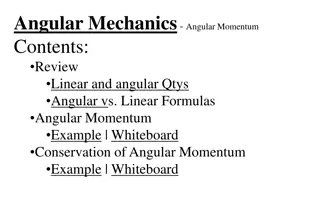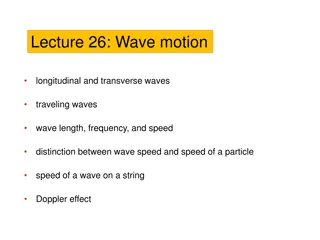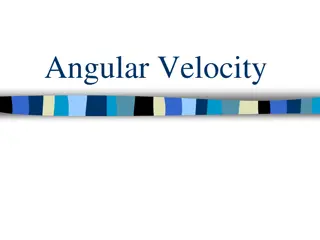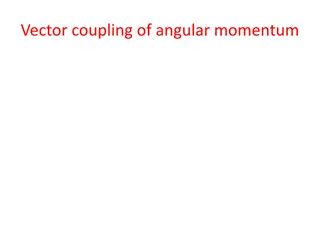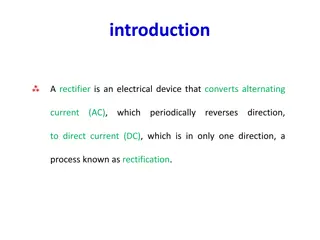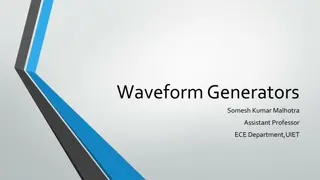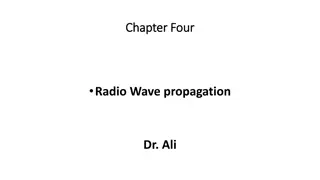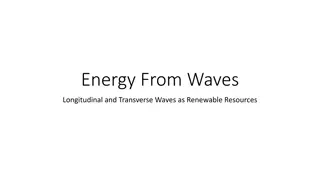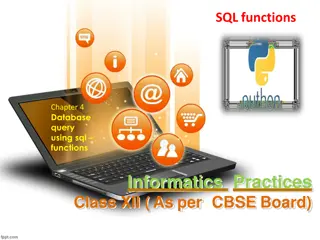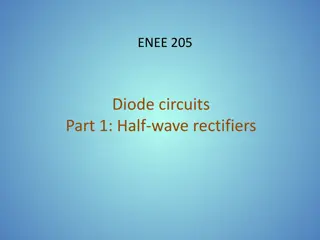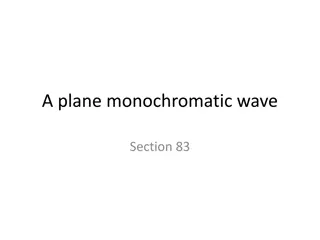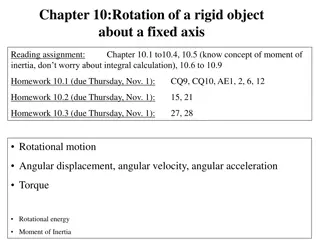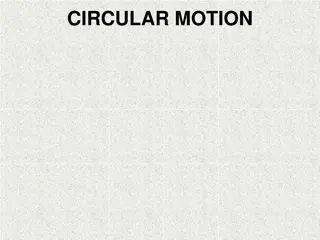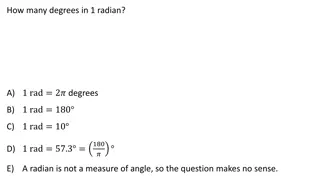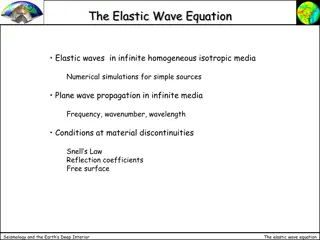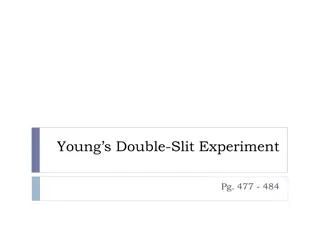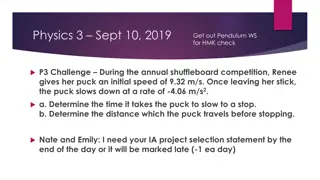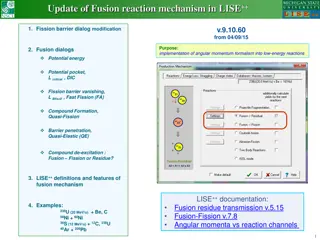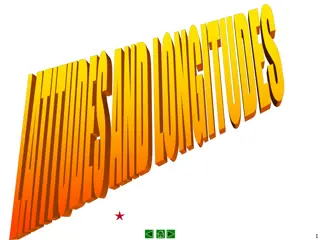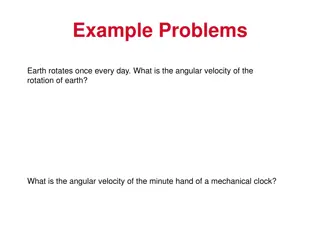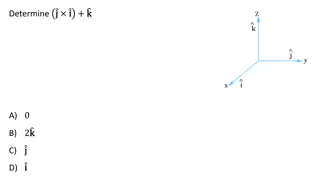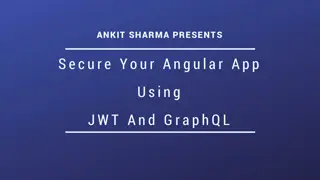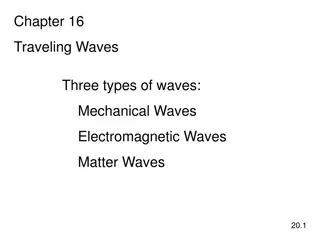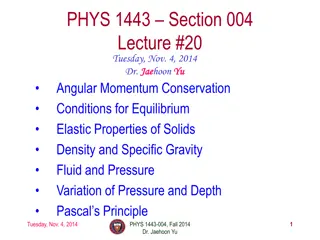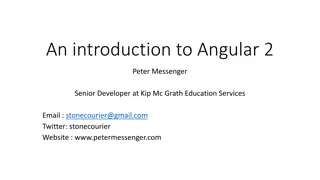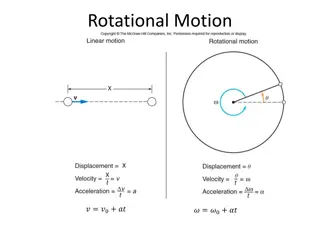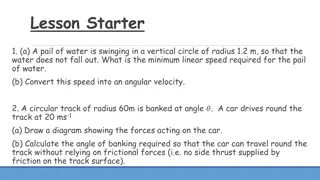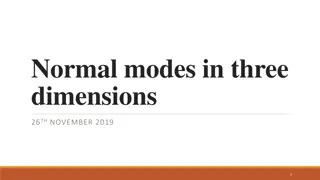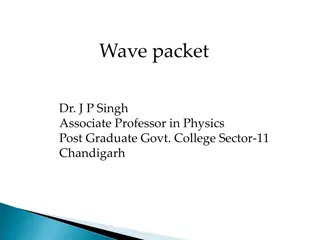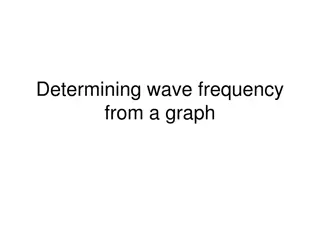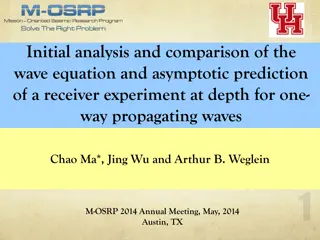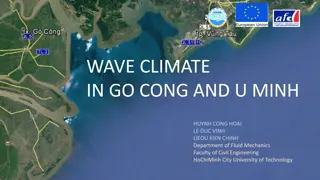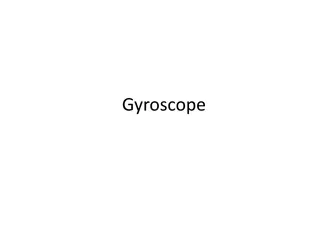Understanding Waves, Light, & Sound: Vocabulary and Concepts
This chapter covers essential vocabulary and concepts related to waves, light, and sound, including amplitude, crest, diffraction, Doppler effect, electromagnetic wave, frequency, interference, longitudinal wave, mechanical wave, medium, photon, pitch, reflection, refraction, sound wave, standing wa
8 views • 21 slides
Understanding Cylindrical Wave Functions and Bessel Equations in Electromagnetics
Exploring cylindrical wave functions and Bessel equations, derived from the Helmholz equation, for understanding wave propagation dynamics in electromagnetics. The notes cover separation of variables, solutions for R and Z, Bessel functions, and more.
3 views • 50 slides
Hydrologic Modeling Methods in HEC-HMS: A Comprehensive Overview
Explore the transformative methods within HEC-HMS hydrologic modeling, including unit hydrograph derivation, excess precipitation transformation, hydrograph illustration, surface transform methods, and concepts like the kinematic wave and 2D diffusion wave. Learn about the unit hydrograph, kinematic
0 views • 41 slides
Understanding Angular Momentum in Mechanics
Explore the key concepts of angular momentum in mechanics, including the difference between linear and angular quantities, angular momentum calculations, conservation principles, and practical examples illustrated on whiteboards. Delve into formulas, equations, and scenarios to grasp the fundamental
4 views • 27 slides
Angular Mechanics - Angular Momentum Concepts and Examples
Understanding angular momentum in mechanics involves reviewing linear and angular quantities, comparing angular to linear formulas, and exploring examples of angular momentum and conservation principles. The content covers key factors like angular quantities, torque, and moment of inertia, along wit
3 views • 23 slides
Understanding Wave Motion: Longitudinal and Transverse Waves
Explore the fundamentals of wave motion including longitudinal and transverse waves, wave length, frequency, speed, and the Doppler effect. Learn about different types of waves, their characteristics, and the distinction between wave speed and the speed of a particle. Discover the properties of wave
2 views • 18 slides
Livestock Marketing Functions and Classification
Livestock marketing involves various functions such as exchange, physical supply, facilitative functions like grading, transportation, storage, and more. These functions are classified into primary, secondary, and tertiary functions based on their roles. Assembling, processing, distribution, and equ
3 views • 23 slides
Understanding Rotational Motion: Angular Velocity and Acceleration
Explore the concepts of angular velocity, radians, and rotational motion in this educational content. Learn about the relationship between angular and linear velocity, angular acceleration, tangential acceleration, and centripetal acceleration through practical examples. Enhance your understanding o
2 views • 17 slides
Understanding Angular Momentum in Quantum Mechanics
Exploring the concept of total angular momentum in quantum mechanics, which involves the quantization of orbital and spin angular momenta. The coupling of these vectors leads to the formation of total angular momentum, with implications for the behavior of single-electron systems like the hydrogen a
0 views • 16 slides
Understanding Rectifiers: Types and Working Principles
A rectifier is a crucial electrical device that converts AC to DC, allowing current to flow in only one direction. Explore the different types of rectifiers like half-wave and full-wave, along with their working principles and efficiency considerations. Dive into the explanation of rectification pro
0 views • 15 slides
Understanding Waveform Generators in Electronic Circuits
Waveform generators, such as square wave oscillators and triangular wave generators, play crucial roles in electronic circuits. Square wave oscillators use capacitors and op-amps to create square wave outputs through charging and discharging processes. On the other hand, triangular wave generators u
1 views • 11 slides
Understanding Radio Wave Propagation in the Ionosphere
Radio wave propagation in the ionosphere is influenced by factors such as the radio refractive index and absorption of radio wave energy. This chapter delves into the interaction of radio waves with the ionosphere, discussing concepts like the electromagnetic spectrum nomenclature and the frequency
0 views • 15 slides
Harnessing Wave Energy: A Renewable Resource for Sustainable Power Generation
Utilizing the kinetic energy of ocean waves through transverse and longitudinal wave interactions, wave energy presents a promising renewable resource for electricity generation. This form of renewable energy, akin to wind power, involves converting the motion of waves into electrical power by deplo
0 views • 16 slides
Evolution of Light Theory: From Wave Theory to Quantum Theory
At the turn of the century, the discovery of the photoelectric effect challenged the wave theory of light, leading to the development of the quantum theory by Max Planck and Albert Einstein. This new theory introduced the concept of discrete energy units known as quanta, bridging the gap between wav
1 views • 62 slides
Understanding SQL Functions for Database Queries
SQL functions are essential elements in performing actions and obtaining results in a database query. They come in two main types: scalar functions and aggregate functions. Scalar functions operate on single values, while aggregate functions operate on sets of data. Examples of SQL functions include
0 views • 14 slides
Understanding Angular Overlap Method in Advanced Inorganic Chemistry
Exploring the Angular Overlap Method (AOM) in advanced inorganic chemistry provides a qualitative discussion on the physical rationale behind the theory of complexes. By considering the interaction of atomic orbitals and the degree of overlap, AOM offers insights into energy quantification in coordi
0 views • 15 slides
Understanding Diode Circuits: Half-Wave Rectifiers and Full-Wave Rectifiers
Diode circuits play a crucial role in converting AC signals to DC signals. This article covers the basics of diodes, half-wave rectifiers, and full-wave rectifiers. It explains the functioning of unfiltered and filtered rectifier circuits, highlighting the differences in ripple effects and voltage r
6 views • 18 slides
Understanding Complex Wavevectors in Homogeneous Media
Exploring the concept of complex wavevectors in a homogeneous medium, this content delves into monochromatic waves, Maxwell equations, wave propagation, and the relationship between material properties and wave behavior. It discusses how the complex nature of wavevectors impacts fields, damping, and
0 views • 17 slides
Understanding Rotational Motion in Chapter 10
Exploring the concepts of rotational motion in a rigid object, focusing on angular displacement, velocity, acceleration, torque, and moment of inertia. Key topics include angular quantities, relationships between linear and angular motion, and applications in calculating rotational parameters. Pract
0 views • 29 slides
Understanding Circular Motion in Physics
Circular motion involves objects moving in a circular path at a constant speed, experiencing acceleration and centripetal force. This motion is characterized by angular speed, centripetal acceleration, and the necessary centripetal force. The concept of uniform circular motion and angular displaceme
3 views • 38 slides
Physics Concepts: Angular Velocity, Radians, and Acceleration Explained
Understand essential physics concepts such as angular velocity in radians, comparison of angular velocities, tangential velocity, magnitudes of velocities, and angular acceleration as applied to various scenarios like rotating wheels, clock hands, and spinning objects. Dive into the relationships be
1 views • 31 slides
Understanding Elastic Wave Equations in Seismology
Explore the fundamentals of elastic wave equations for seismology, including topics such as plane wave propagation, reflection coefficients, and wavefield simplifications using curl and div operators. Learn about P-waves, shear waves, and elastodynamic potentials in the context of infinite homogeneo
0 views • 31 slides
Understanding Young's Double-Slit Experiment and Interference Patterns
Thomas Young's double-slit experiment in the late 1700s provided evidence of light behaving as a wave, showcasing interference patterns. This experiment challenged the particle theory of light and supported the wave theory. The interference patterns observed helped scientists grasp the wave nature o
0 views • 27 slides
Introduction to Rotational Motion in Physics
Explore the concepts of rotational motion in physics, including angular displacement, angular velocity, and angular acceleration. Understand how objects move in circular paths and learn about the relationships between linear and rotational variables. Dive into the study of extended bodies and the dy
0 views • 15 slides
Implementation of Angular Momentum Formalism in Low-Energy Fusion Reactions
This update focuses on integrating the angular momentum formalism into low-energy fusion reactions using the LISE++ platform. It explores fission barriers, potential energy pockets, compound formation, and de-excitation processes in fusion reactions. The documentation delves into fusion residue tran
0 views • 25 slides
Understanding Latitude and Angular Distance on Earth
This content explains the concepts of latitude, angular distance, and distances on Earth using images and descriptions. It covers topics such as North Pole latitude, parallels of latitude, angular distance calculations, nautical miles, and great circle distances. Explore how these concepts relate to
0 views • 12 slides
Understanding Angular Velocity, Torque, and Conservation of Angular Momentum in Physics
Earth's angular velocity, minute hand rotation, torque calculations, application of torque in balancing seesaws, motion equations, and car deceleration scenarios are explored. Concepts like rotational inertia, kinetic energy, and conservation of angular momentum are discussed, providing a comprehens
0 views • 6 slides
Understanding Angular Momentum and Rotational Dynamics in Physics
Explore concepts related to angular momentum, torque, and rotational dynamics in physics. Learn about the behavior of spinning objects, the effects of changing moments of inertia, and how angular momentum is conserved in different scenarios.
0 views • 35 slides
Secure Your Angular App Using JWT and GraphQL
Ankit Sharma presents an insightful talk on securing Angular applications using JWT and GraphQL. He discusses the technology stack involving .NET, Angular, and GraphQL to create a secure API system with route guards. The talk explains the significance of JWT and when to use it, detailing its structu
0 views • 21 slides
Understanding Traveling Waves: Types, Properties, and Equations
Explore the world of traveling waves, including mechanical, electromagnetic, and matter waves. Learn about transverse and longitudinal wave motion, the speed of waves in strings, wave frequency, wavelength, and speed relationships, as well as wave equations for non-repeating waves over space and tim
1 views • 30 slides
Angular Momentum Conservation in Physics: Understanding Principles and Applications
Explore the concept of angular momentum conservation in physics, covering conditions for equilibrium, elastic properties of solids, density, specific gravity, fluid dynamics, pressure variations, and Pascal's Principle. Delve into examples like neutron star rotation and planetary motion to understan
0 views • 15 slides
Angular 2 Overview and Benefits
Angular 2, developed by Google using TypeScript, is a popular JavaScript framework known for creating web and native applications. This post explores its features, benefits, development history, and the application being worked on by Peter Messenger. Learn about TypeScript advantages, components, an
0 views • 29 slides
Understanding Rotational Motion and Angular Variables in Physics
Exploring rotational motion in physics, including the definition of angles in radians, conversion between degrees and radians, angular variables, torque, Newton's second law for rotating bodies, moment of inertia, rotational kinetic energy, and angular momentum. Learn about key concepts and equation
0 views • 15 slides
Understanding Angular Momentum in Physics
Learn about the concept of angular momentum in physics through practical examples and explanations. Explore how angular momentum is conserved in rotating bodies and how it impacts various sports activities. Discover the relationships between moment of inertia, angular velocity, and conservation of a
0 views • 19 slides
Understanding Standing Waves in Three Dimensions
Exploring the concepts of normal modes, wave equations, and standing waves in three-dimensional spaces, including the derivation of wave functions within rectangular enclosures and the calculation of normal mode frequencies. The content discusses boundary conditions, particular wave functions, and d
0 views • 19 slides
Understanding Wave-Particle Duality in Physics
Explore the complex relationship between particles and waves in physics, as particles exhibit wave-like behavior described by wave packets rather than single waves. Delve into the concept of group velocity and phase velocity, and how a particle's behavior is represented by a wave function. Uncover t
0 views • 12 slides
Understanding Wave Frequency and Periodicity Graphically
This instructional material provides a visual guide on determining wave frequency and period from graphs displaying wave cycles over time. It explains concepts such as the relationship between cycles and time, measuring frequency in Hertz (Hz), understanding wave periods, and calculating frequencies
0 views • 25 slides
Analysis and Comparison of Wave Equation Prediction for Propagating Waves
Initial analysis and comparison of the wave equation and asymptotic prediction of a receiver experiment at depth for one-way propagating waves. The study examines the amplitude and information derived from a wave equation migration algorithm and its asymptotic form. The focus is on the prediction of
0 views • 23 slides
Study on Wave Climate in Go Cong and U Minh Regions
This study focuses on analyzing the wave climate in Go Cong and U Minh areas in Vietnam using the Telemac-Tomawac wave model. The research covers the simulation of wind-wave characteristics in the East Sea and West South Sea over a 3-year period. Data input, model setup, calibration, and computed do
1 views • 27 slides
Understanding Gyroscopes and Angular Momentum
Explore the concept of gyroscopes, angular momentum, and gyroscopic effects in vehicles like ships and airplanes. Learn about mass moment of inertia, angular velocity, and the precession of gyroscopes in detail. Dive into the physics behind the change of angular momentum and solve a problem involvin
0 views • 12 slides



